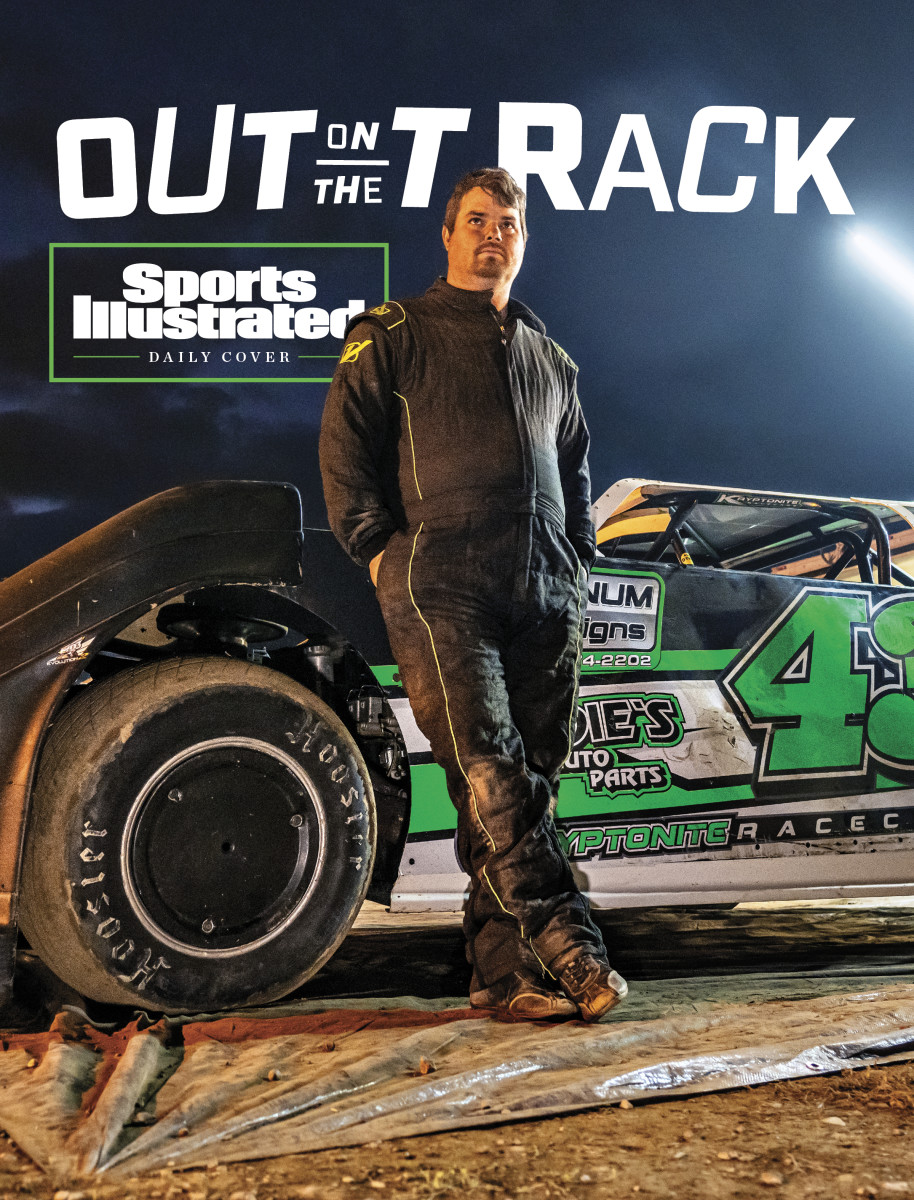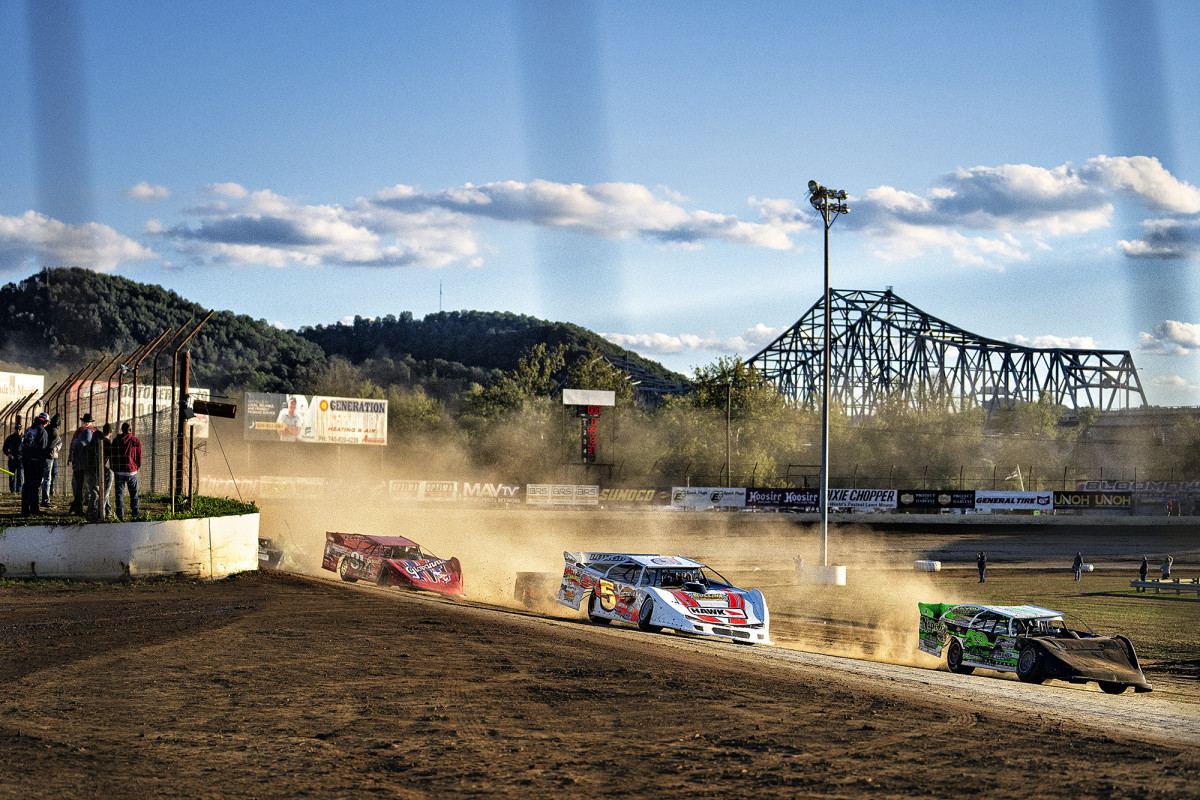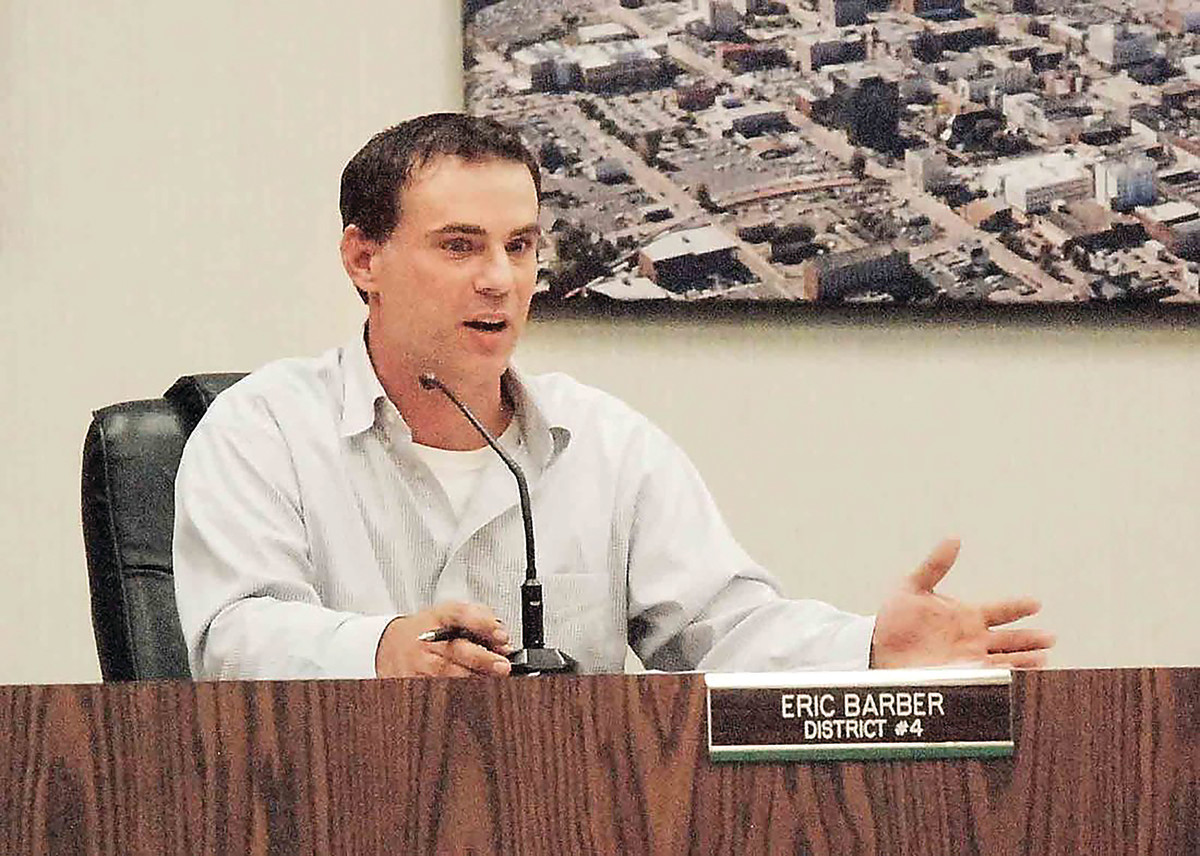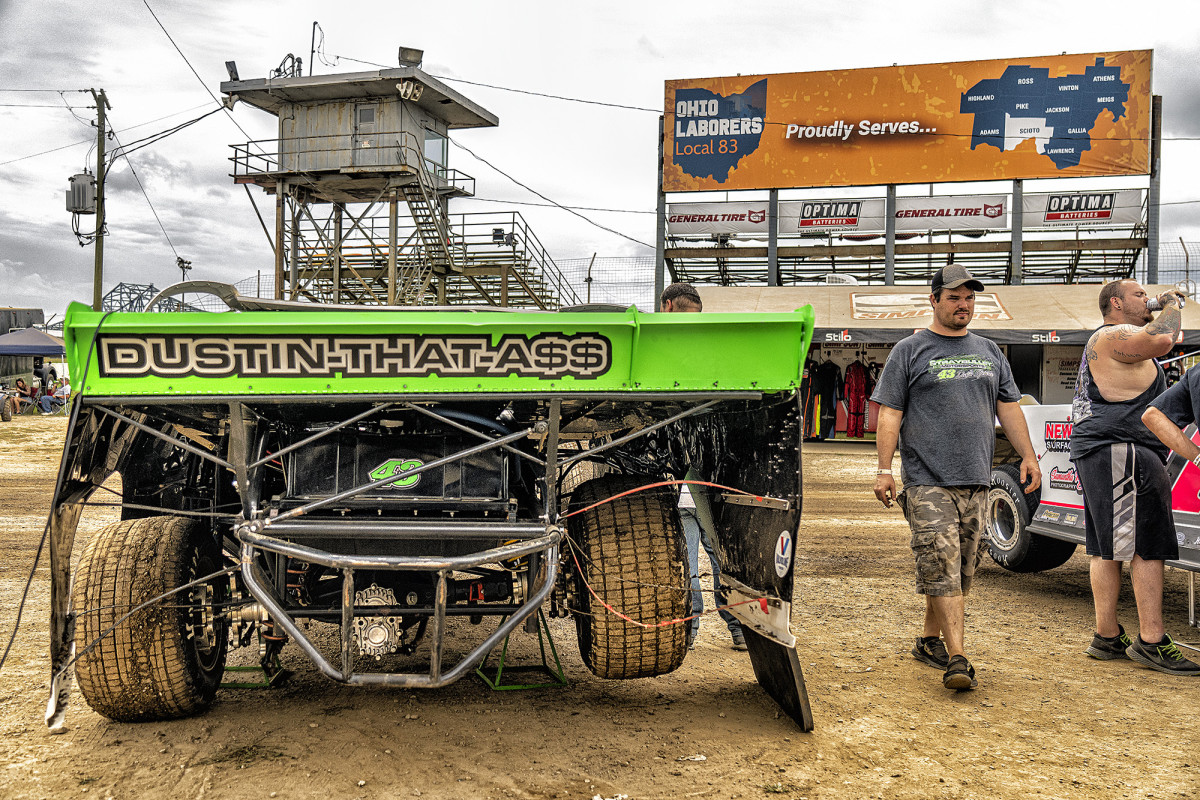Dustin Sprouse Is an Openly Gay Dirt Track Racer. His Life Is Complicated.

When the green flag drops, the bulls---stops.
It’s the unofficial slogan of dirt track racing. But at least on this crisp October night, it’s all business before the race starts. Twenty-five stock cars take their places at Raceway Park, a 3/8-mile oval in southern Portsmouth, Ohio, hard by the Ohio River, where Kentucky, West Virginia and Ohio touch bumpers. Engines rev and screech. Drivers’ eyes narrow like blinds as they stare straight ahead, applying death grips to their steering wheels. The smell of exhaust and gasoline hangs in the air.
When the starter finally whips his flag, the drivers are off, racing for 25 laps, seeing who can be the first to make 100 left turns. Spewing out from the limited late-model cars—with their flat, pointed fronts, high tails and souped-up engines—cloudbursts of dust hover over the track before drifting toward grandstands packed with fans. This was the 41st annual Dirt Track World Championship, the season finale for a nine-month circuit that wends its way through the tracks of Appalachia and the Midwest, where the sport’s heartbeat pulses loudest.

Through the plumes, it was hard not to notice (and hear) a green-and-white Steel Block Late Model with a Kryptonite chassis, bearing plenty of dents, the legacy of a season of racing. In lieu of sponsor decals—of which there are suspiciously few—the car’s rear bears a decal that strays from your conventional bit of trash talk.
It reads: DUSTIN-THAT-A$$.
Dustin Sprouse drives the No. 43 car, christened in honor of Richard Petty. And, like the King, he is relentlessly friendly and open. He has a habit of absently fiddling with the diamond earrings in his left and right lobes as he speaks, which is often, and a high-pitched voice at odds with his burly physique. His accent reveals his home: the countryside of West Virginia. His fallback look is a warm smile, framed inside his trim goatee. He is also an openly gay dirt track driver; perhaps the only openly gay dirt track driver.
With five top-10 finishes in his last 11 races this year, the 35-year-old Sprouse entered Portsmouth having already locked up the Rookie of the Year award for his class. In the caste system of auto racing, Sprouse has several more levels to navigate before he can reach his ultimate goal of dirt track racing’s top rung, the Lucas Oil Late Model series. “That’s when I can really live the dream,” he says, as his green eyes widen. To ascend to that level, though, drivers need sponsors, providing them with the best equipment and the finances to hire full-time crews. Sprouse, in other words, needs the sides of his car to fill up with ads.
Still, in a sport where careers can last decades and there are drivers racing competitively into their 60s, he is, undeniably, an athlete on the rise (even if he finished a disappointing 19th at Portsmouth). “No question,” says Tyler Carpenter, 30, a prominent dirt track driver and fellow West Virginian, “Dustin is a real good dirt track driver.”
His 2,350-pound race car is almost like an extension of his body. Maneuvering around tracks, Sprouse possesses a preternatural sense for when to press and when to hang back. There is a poise and a patience to Sprouse’s driving, apparent even to the novice dirt racing observer. “You can’t win the race in the first lap,” is a line he’s fond of issuing.
Out of the sport for more than a decade, he returned to dirt track racing this April. Car technology—and, by extension, the entire sport—had evolved considerably in his absence. But Sprouse made a seamless reentry. “It’s like riding a bike,” he says, smiling, as ever, “a bike with four wheels.”
In a culture—and often in pockets of America—that can proudly, willfully, resist cultural change and social progress, Sprouse had to strategize about revealing his sexuality at the track, much as he must assess risk behind the wheel. He landed here: “I don’t flaunt it in people’s faces. When I’m at the racetrack, I’m just another guy there competing, racing. I’m just one of the guys. What I do behind closed doors is my business, not theirs. But if you ask me, I will tell you, ‘Yeah, I’m gay.’ ”

Dustin Sprouse has loved racing as long as he can remember. He, in fact, barely had a choice. Before their two sons were born, Frank and Nancy—Dustin’s parents—raced cars and Jeeps. Frank spent a decade racing modifieds on dirt tracks. When Frank’s driving mentor, Keith Boston, died of a heart attack on his way to the garage, Frank lost interest. But by then, his sons were already hooked. Dustin’s brother, Mike, seven years his senior, has been a competitive driver for the last quarter century.
Just as families in Texas ritually go to high school football games on Friday nights, the Sprouses spent most weekends at one of the 20 dirt tracks within a three-hour drive of their base of Parkersburg, W.Va. At the family home, Dustin spent innumerable hours handling wrenches and learning about engines, chassis and carburetors. He entered his first race at 13 and won his first one at 15, a year before he got his actual license to drive. “I was born to race, pretty much as simple as that,” he says. “Once it’s in your blood, you can’t get it out.”
At the same time, Sprouse was reckoning with another part of his identity. He resisted at first. When he didn’t attend his prom at Parkersburg South High and headed to the racetrack instead, he attributed it to nothing other than overriding fondness for racing. He not only dated girls but also got engaged to his high school girlfriend by the time he was 18. “I just tried to make everybody happy by doing the American dream and stuff,” he says. Within a few years, though, he called off the engagement to, as he says, be who he is.
When he came out, he was in his early 20s. Around the same time, he stepped away from racing, he says because he simply ran out of money to compete. His family was accepting, if worried. Frank has a gay brother and recalls the bullying he received growing up in West Virginia. “Life back then was different,” says Dustin. “You had to run down the streets to make sure you didn’t get beat up and stuff like that. And my dad didn’t want me to go through that. I had to explain to him, the world is different.”
In fact, when word spread through Parkersburg, Sprouse found he was generally accepted. In part because of that warm reception, Sprouse decided to rejoin racing in 2021. His team, Straybullet Motorsports, includes his older brother and another Parkersburg driver, Biff Brookover.
The conventional wisdom might, of course, go like this: Both red-state America and a fossil-fuel-burning sport would be something less than hospitable to an openly gay driver. But a news flash too easily forgotten in these binary, tribal, polarized times: People are complicated. So are their communities.
Auto racing might be known for its conservative leanings, prerace prayers and the omnipresence of Confederate flags, a particular stain upon the sport. (NASCAR banned the flags’ display last year, but not all circuits have followed suit.) It also comes from a tradition of counterculture bootlegging and skepticism of authority. Who was among the first mainstream athletes to support Colin Kaepernick? Dale Earnhardt Jr. Earlier this month, a Black driver, Bubba Wallace, won a NASCAR race at Talladega driving a car co-owned by . . . Michael Jordan. Then again, last year, a NASCAR driver made headlines when he was suspended for using the n-word while gaming.

Since his return to racing, yes, Sprouse has heard the f-word, what he calls “the worst word in the vocabulary of the LGBT community.” Friends tell him it’s been used, as well, when he’s been out of earshot. Sprouse says that when he won his first race, “I actually had somebody come up to the fence, and they said to me they hope I die.”
But, overwhelmingly, he feels that he’s judged on his performance, skills and sportsmanship, not on his sexual orientation. He has a small army of fans and is popular among other drivers. Sprouse’s ex-fiancée married a man who is now a driver; he and Sprouse are friends.
At the West Virginia Motor Speedway in Mineral Springs, the closest thing Sprouse has to a home track, driver after driver, fan after fan, hit on the same theme. “There’s a saying in racing: You race me like I race you,” says Eric Barber, who works on Sprouse’s crew. “If you’re mean to me, I’m gonna be mean back. If you’re loyal to me, I’m going to be even more loyal to you.”
The relationship between Barber and Sprouse encapsulates this. Barber, now 43, grew up in Parkersburg and was close with the Sprouse family, especially Dustin’s older brother. In 2016, running as a Democrat, he won a spot on the city council. He found himself at odds with more liberal members, whom he felt were attacking his Christianity. He left the Democratic Party, becoming unaffiliated. He had cosponsored a nondiscrimination ordinance but, after a disagreement with the council’s liberal members, voted against it. In an increasingly bitter environment, he lost his election in November 2020 and then took his feuds to social media.
Then, the first week of the year, Barber headed to Washington, D.C. On Jan. 6, Barber, donning a green combat-style helmet and military-style field jacket, entered the U.S. Capitol. In a YouTube video from the insurrection, Barber can be identified. He was among the first of those storming the building to be arrested and charged.
Barber, who was indicted on multiple charges, including theft and disorderly and disruptive conduct in a restricted building, says that he plans to take a misdemeanor plea in December and, unlike so many involved in the breach, he feels shame and remorse. And racing is part of his therapy. “I did my time in the trenches and served on the tip of the spear in this partisan war, and I don’t want any part of it. I want to live my life in peace,” he says. “I substituted Facebook and social media with motor sports. And I can tell you my mental health drastically improved.”
At first blush, anyway, it’s an unlikely pairing: the openly gay driver and the crew member who breached the Capitol. Neither Barber nor Sprouse sees it that way. They say their shared love of racing and shared history overrides all. “My door on my garage, it’s like the gate at the racetrack,” Sprouse says. “Once you go through there, we don’t talk about [social issues]. It’s racing. Racing brings people together. We’re not friends. We’re family. Everybody there’s family.”
Besides, it’s not always easy to guess who’s positioned where on the political spectrum, another reminder that people are complex and that easy binary shorthand often fails us. As Barber distances himself from politics, Sprouse says, “I ain’t gonna lie, I will be the first one to say, ‘Yeah, I’m gay, but I’m a Trump supporter.’ ”

Race cars are like strippers: i keep throwing money at them hoping for the ride of my life. So reads a popular T-shirt they sell at the tracks of West Virginia. If this reinforces, unsubtly, just how male, heterosexual and indelicate racing can be, it also speaks to another truth: The sport is damn expensive.
Even before the current kinks in the global supply chain threatened to jack up prices even more, you’d be hard-pressed to find a sport with higher barriers of entry. Tires cost $180 a pop. You can’t buy a decent engine for under $30,000. A driver’s seat and harness will set you back $2,000. This is to say nothing of gas that runs between $11 and $15 a gallon, and might be good for a mile of dirt track driving. And quite clearly there’s no GEICO 15% or Progressive bundle for guys who drive their cars 120 mph in tight spaces. One crash can result in $25,000 worth of repairs.
As a consequence, races are often won in the garage or, more accurately, on balance sheets. Drivers can put in the work and make sure every bolt is tight. But if you don’t have financial backing, there’s the equivalent of a restrictor plate on your success. Their cars plastered in logos, the rich get richer. The unrich struggle. And here is where Sprouse feels the sting of anti-LGBTQ prejudice most sharply.
While he can’t prove that sponsors have avoided his car because he is gay, it is conspicuously light on decals compared with other competitors’. Time and again, he’s gotten vague promises of help, only to see the partnerships fizzle. He can draw only one conclusion. “I’ve found it hard with my lifestyle to get sponsors,” he says. “It’s also harder for me to ask somebody because I’m afraid to be judged. And I don’t want that.”
Midway through a race earlier this year, Sprouse was hanging with Scott Bloomquist, a towering figure of dirt track racing, whose many partners include Penske and Hoosier Racing Tires. On the 18th of 35 laps, Sprouse’s fan belt gave out, and he had to leave the race. “I have three of the four pillars,” he says. “I have the crew. I have the technical support. And I have the moral support of the family and stuff. I just need the financial support.”
Sprouse has also had to economize whenever possible. He doesn’t change tires as often as he’d like. Relying on the kindness and community of other drivers, he borrows equipment. He picks and chooses his races.

Sprouse works full-time as a customer service rep at DHL in Parkersburg and makes “decent money.” He lives at home to avoid paying rent. Even so, he has nearly bankrupted himself trying to become a full-time driver. Kryptonite Racecars—one of his few sponsors—gives Sprouse free technical help, sells him parts at cost and allows him to pay on credit. Even with that bit of generosity, Sprouse estimates he owes the company in excess of $10,000. “Every last penny I have is in these race cars,” he says between drags of a Marlboro. “I mean, my bank account right now, it’s $20
in there.”
It’s a source of both hope and pity that, as his finances are ebbing, both his results and dirt track racing more generally are flowing. All while NASCAR’s popularity has stalled out. When Tony Stewart, NASCAR royalty, recently bought a dirt track, not a paved one, it hardly went unnoticed in the racing community. Neither did the fact that, earlier this year, the Bristol Motor Speedway held a Cup Series race on dirt, the first for NASCAR’s highest level in 51 years.
The racing is a sort of happy anarchy, an unruly fleet, screeching and juking and angling and avoiding collisions and walls by a distance no wider than the iPhone so many fans hold as they film the races. And sometimes not. After plenty of dirt races, cars leave the track bearing the paint and tire tracks of their competitors. Or dented like the crushed cans—beer, Red Bull, mostly Mountain Dew—arrayed on the Raceway Park grounds.
For better and sometimes worse, it’s a freewheeling alternative for the legion of racing fans who have grown tired of—and even feel betrayed by—NASCAR’s rules and regulations, many of which have tried to level the playing field but ultimately, fans complain, made cars indistinguishable. NASCAR drivers win races and dutifully thank the corporate supporters. Dirt track racers win races and make comments like the one Carpenter issued last year after winning a big race: “I didn’t come here to f--- around.”
This same, shall we say, accessibility is obvious at events. Weekend grounds passes go for $50 or so, to be amortized over dozens of heats and races. Fans recognize one another from races in other states. There is an unmistakable warmth. Just as drivers swap parts and lend one another equipment, fans pass around communal foods. At the West Virginia Motor Speedway, Nancy Sprouse is known for providing chili and summer sausage made from venison Frank bagged during deer season.
As warm as the sense of community around the sport can be, Sprouse still lives its contradictions every day: Within this same culture comes the abuse he hears from fans. And it allows for the sides of his car to be barren. Most dirt track circuits continue to permit fans to display the Confederate banner—a reminder that, for all NASCAR’s corporate starch, there is good reason for some of its rules.
After the last race of the season, Dustin Sprouse will go back into the garage and tinker with his car. For all the obstacles in his way, when he takes inventory of his season, he smiles. “I’m low-cost. I’m taking used bars, stuff from people, and I’m competing with these guys . . . and they’re out there in $100,000 cars and stuff?” He laughs at the tableau, imagining his competition. “There’s a gay male with used and borrowed stuff from people, and he’s [ahead of] me. What’s in their mind? That’s what the real question is.”
And that leads him to look ahead to 2022 and audition some playful trash talk: “Your straight butts are chasing my gay butt around the racetrack. ’Cause I’m beating you.”
More SI Daily Covers:
• Guns, Drugs and Football Thugs
• Bowl Season is Coming. And There Are Only 36 Pylons Left.
• He Should be in High School. Instead He's in the G League. And He's the Future.
